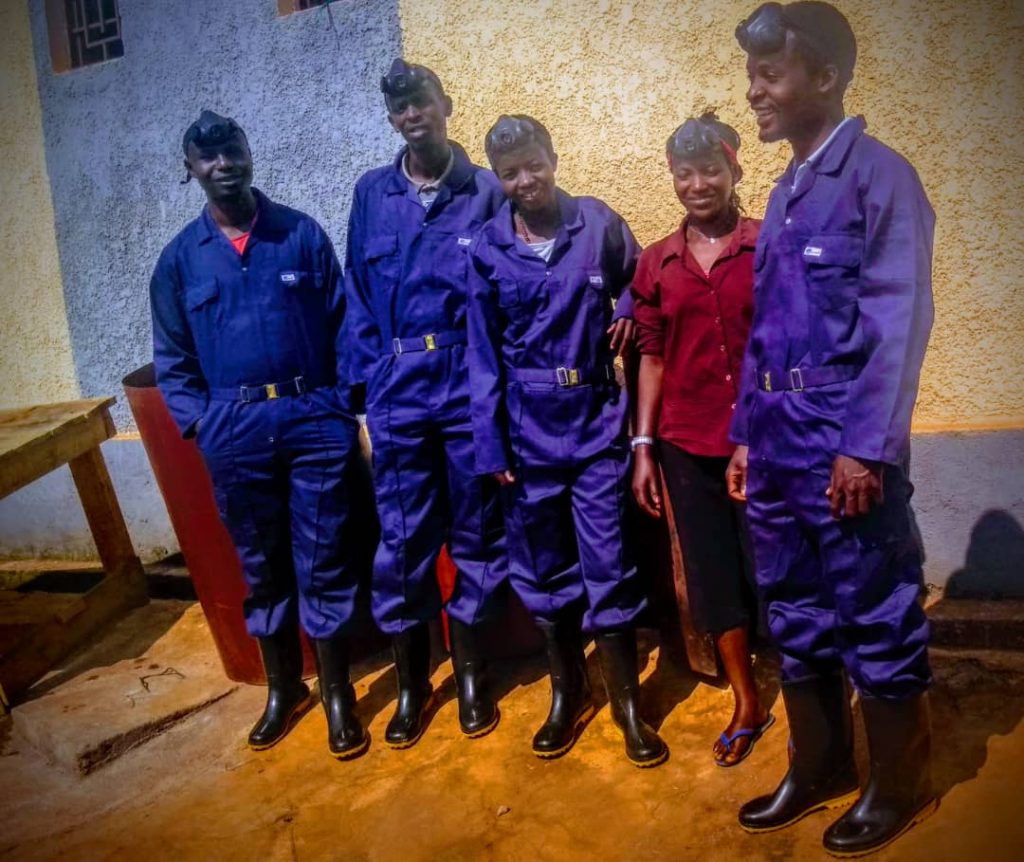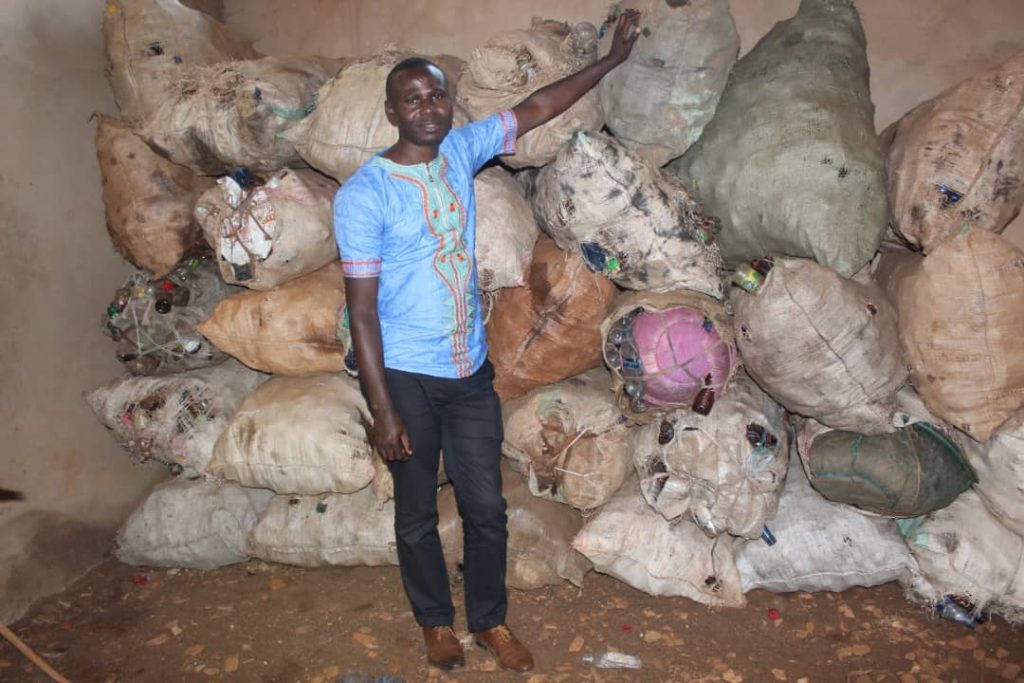Plastic waste is one of the types of solid wastes which are of national and global concern nowadays. In this regard, Jean Marie NIZIGIYIMANA started producing pavement tiles from plastic waste. This roomed in his mind in 2018 as he graduated from the Polytechnic University of Gitega, in the Department of Water, Pollution and Sanitation. In addition to theoretical notions learnt in the classroom at the university, Mr. NIZIGIYIMANA did extensive research on the recycling of plastic waste. He went on starting activities in May 2019 after his company JENI-ECO COMPANY was registered. He currently has five employees composed of two girls and three boys. Below is a full interview with him.
Akeza.net: Who is Jean Marie NIZIGIYIMANA?
Jean Marie NIZIGIYIMANA: My name is Jean Marie NIZIGIYIMANA. I was born in 1984 on Ruhanza Colline, in Giheta Commune, Gitega province. I am laureate of the first promotion at the Polytechnic University of Gitega, in the Faculty of Environmental Sciences, Department of Water, Pollution and Sanitation. I am a young entrepreneur and the Chief Executive Officer of JENI-ECO COMPANY which is recycling plastic waste into pavement tiles. In addition, I am the national coordinator of the Environment Department within the “Forces Unies des Partenaires pour le Développement Durable” (United Forces of Partners for Sustainable Development), FUPDD in acronym. I am married and I live in the city of Gitega, in Karera 2.
Akeza.net: How did you come up with the idea of making pavement tiles from plastic waste?
Jean Marie NIZIGIYIMANA: In 2018, after my studies in the Department of Water, Pollution and Sanitation of the Faculty of Environmental Sciences at the Polytechnic University of Gitega, I thought about hygiene and sanitation in Burundi, especially in big cities like Gitega and Bujumbura. An idea of launching the waste management program in the city of Gitega came into my mind. I shared it with some of my peers. We got the authorization from the municipal administration which gave us the Nyamugari Quarter, in the project we called TUBE HEZA.
Shortly after that initiative of collecting and managing waste, the project expanded in the whole town of Gitega. By then, I took a time to analyze the mountains of waste that were collected in different parts of the city. I sat down pondering on the future of these dumbs scattered in the city. The idea of recycling plastic waste came to my mind. I did an extensive research on the recycling of plastic waste (that I do today) and I started activities in May 2019 after the registration of my company JENI-ECO COMPANY in API (Agence de Promotion des Investissements).
Akeza.net: How did you gather the knowledge to make the pavement tiles?
Jean Marie NIZIGIYIMANA: I may say that it has its roots in the theoretical concepts that I learned at the university and the passion for protecting the environment that I had within me, even before. I did a research from January 2019. I benefited further knowledge from the help of my friends in countries like Canada, Norway, and United States of America. They did provide me with decent ideas on recycling several kinds of waste. After trying for many times, I came up with a type of pavement tile that I am producing today.
Akeza.net: Where do you find the raw materials?
Jean Marie NIZIGIYIMANA: The raw materials come from two sources. There are associations that collect waste. These are my first sources of supply. Then, we have young children who can collect plastic waste, where associations have not reached. The latter bring the plastic waste and sell them to my company.
Akeza.net: How do you proceed to make these tiles? What’s their toughness?
Jean Marie NIZIGIYIMANA: Tiles come from a process of melting a given quantity of plastic waste mixed with other materials like sand. Once the mixture is ready, it is passed through a metallic mold to give it a particular shape. After the molding, there is no need to put them under the sun. Just after one hour or more, they can be used. From our trial period up to now, we have already produced 3,000 tiles, which make up to 120 m2
Comparable to tiles made from cement, tiles from recycling plastic waste are of a tougher hardness. They can even support vehicles transporting heavy goods without any harm.
Akeza.net: In what context did you prefer to make pavement tiles from plastic waste?
Jean Marie NIZIGIYIMANA: Three main objectives are behind what we are doing. Firstly, our work subscribes to the framework of environmental protection by reducing the quantity of plastic waste of all kinds in order to decrease atmospheric pollution (from waste that was burned in the environment), water pollution (from plastic waste poured into rivers and lakes by runoff when it is raining), soil pollution (from plastic waste mixed with the soil which reduce soil productiveness.
Secondly, our work contributes to the reduction of the unemployment rate in Burundi by creating jobs. Lastly, we want to prove to the Burundian youth that nothing is impossible for the ones who have courage and determination.
Akeza.net: How do you set price for a single paver?
Jean Marie NIZIGIYIMANA: Our pavement tiles are sold by square meter. 1m2 is sold at BIF 25,000.
Akeza.net: Who are your customers?
Jean Marie NIZIGIYIMANA: We welcome anyone who wants to pave their plot. We also welcome those who want to pave the car parks of their hotels, restaurants, bars, the front of houses near the roads, etc.
Akeza.net: What are your future goals in producing pavement tiles?
Jean Marie NIZIGIYIMANA: Our work is so far manual and the production is quite limited. Also we are still working in one province among the 18 provinces of our country. We plan to use machines to be able to produce more. Our main goal is to reduce air pollution to more than 80%. We plan also to manufacture other products in addition to pavement tiles in order to push recycling of plastic waste to different level. In this regard, we plan to produce soon nvery good ceilings.
Interview by Melchisédeck BOSHIRWA












